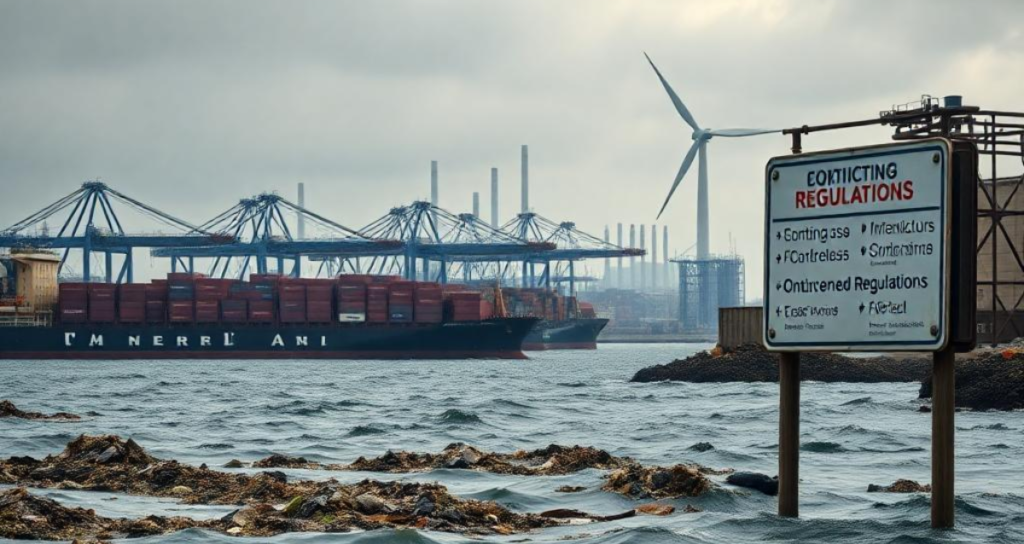The Maritime Technologies Complex (MTC) stands at the forefront of maritime innovation, transforming how industries navigate and utilize the vast oceans. With groundbreaking advancements in technology, the MTC is reshaping marine research, safety protocols, and operational efficiency. This hub of innovation addresses the challenges and opportunities within the maritime domain, providing critical solutions for the evolving needs of the industry.
Maritime Technologies Complex refers to advanced systems, tools, and methodologies used in the maritime industry to enhance efficiency, safety, and sustainability. From shipbuilding to marine conservation technologies, the MTC plays a vital role in supporting global trade and ecological balance. As approximately 80% of international trade relies on maritime transport, these technological advancements are essential for economic growth and environmental stewardship.
Table of Contents
Describe the Maritime Technologies Complex
Designed to create and test innovative marine technologies, the Maritime Technologies Complex (MTC) is a specialized facility Acting as a research and innovation center, it brings together organizations, engineers, and professionals to create tools and solutions for marine problems.
Significant Objectives and the Vision of MTC
The Maritime Technologies Complex aims to revolutionize the maritime sector through innovation, sustainability, and enhanced safety measures. Key objectives include:
The Maritime Technologies Complex (MTC) has set a clear vision to revolutionize the maritime sector, focusing on innovation, sustainability, safety, and global collaboration. This vision is not merely a statement of intent but a roadmap for the future of maritime technology.
Innovation: The MTC is committed to driving technological advancements to improve the efficiency, safety, and sustainability of maritime operations. This includes the development of new technologies such as autonomous vessels, advanced propulsion systems, and innovative maritime infrastructure.
- Case Study: The MTC’s recent development of a new type of anti-fouling paint that reduces drag and fuel consumption in ships is a prime example of its commitment to innovation. This technology not only improves the efficiency of shipping operations but also reduces greenhouse gas emissions, contributing to a more sustainable maritime sector.
Sustainability: Recognizing the critical importance of environmental protection, the MTC is dedicated to promoting eco-friendly solutions and preserving marine ecosystems. This includes the development of zero-emission vessels, the promotion of renewable energy sources in maritime operations, and the implementation of sustainable waste management practices.
Safety: The MTC places a high priority on ensuring the safety of maritime professionals and assets. This includes the development of advanced safety systems, the implementation of rigorous safety protocols, and the promotion of maritime safety training and education.
- Case Study: The MTC’s development of a new type of collision avoidance system that utilizes artificial intelligence is a testament to its commitment to safety. This system can help to prevent accidents and save lives at sea.
Global Collaboration: The MTC recognizes the importance of international cooperation in addressing the challenges facing the maritime sector. It actively seeks to foster partnerships with other maritime organizations, research institutions, and industry stakeholders to share knowledge, resources, and best practices.
By adhering to these key objectives and fostering a culture of innovation, sustainability, safety, and global collaboration, the Maritime Technologies Complex is poised to play a leading role in shaping the future of the maritime sector.
Foundation Elements of the Maritime Technologies Complex
The MTC encompasses state-of-the-art facilities designed to support cutting-edge research and development. Key components include:
Research and Development Centres: These labs are the lifeblood of the MTC, fostering innovation in marine science. Scientists and engineers collaborate on:
- Autonomous vessel design.
- Advanced navigation systems.
- Eco-friendly propulsion technologies.
Training and Simulation Facilities: Preparing maritime professionals for real-world challenges is critical. The MTC’s simulation chambers recreate:
- Adverse weather conditions.
- Emergency scenarios like oil spills.
- Navigation through congested waterways.
Ocean Testing and Innovation Areas: These zones provide a controlled environment for testing:
- Next-gen underwater drones.
- Smart shipping containers.
- Renewable energy systems such as offshore wind turbines.
Applications of Maritime Technologies
The innovations emerging from the Maritime Technologies Complex are transforming multiple sectors:
1. Business Shipping: MTC innovations streamline shipping by:
- Optimizing routes to reduce fuel consumption.
- Enhancing cargo tracking with IoT devices.
- Minimizing risks through predictive maintenance.
2. Environmental Sustainability and Marine Conservation: The MTC supports ecological preservation by:
- Developing tools to monitor water quality.
- Innovating sustainable fishing techniques.
- Creating renewable marine energy solutions.
3. Defense and Security: Advanced technologies from the MTC bolster national security by:
- Improving surveillance with autonomous underwater vehicles.
- Enhancing communication systems for naval operations.
- Strengthening port security against potential threats.
Challenges Facing the Maritime Technologies Complex

The Maritime Technologies Complex, despite its remarkable strides, faces significant hurdles. These challenges include:
- Economic Challenges: High costs associated with research and development, coupled with the substantial investments required for infrastructure development, pose a significant barrier to innovation within the Maritime Technologies Complex.
- Environmental Concerns: “Balancing the pursuit of technological advancement with the preservation of our oceans is paramount. The Maritime Technologies Complex must prioritize sustainable practices and minimize its environmental footprint.
- Regulatory Issues: Navigating the complex web of international maritime laws and regulations presents a considerable challenge.
Case Study: The recent implementation of the IMO’s EEXI and CII regulations has forced the Maritime Technologies Complex to adapt quickly and invest heavily in energy-efficient technologies and decarbonization strategies.
Addressing these challenges effectively requires sustained investment from both public and private sectors, alongside robust international cooperation.
Marinerical Technologies Complex Future Innovations
The Maritime Technologies Complex (MTC) is on the cusp of a transformative era, driven by a convergence of cutting-edge technologies. Exploring trends like green shipping, AI integration, and the expansion of the blue economy reveals a future where the MTC will play a pivotal role in shaping the maritime landscape.
1. Green Shipping
- Decarbonization: The MTC is spearheading the development of zero-emission vessels, including those powered by hydrogen fuel cells, wind power, and solar energy.
- Hypothetical Case Study:
The MTC is collaborating with (Company Name: Corvus Energy), a leading provider of maritime energy storage systems, to develop a battery-electric ferry for use in (Location: the San Francisco Bay Area). This project aims to demonstrate the feasibility of zero-emission vessels in a real-world setting, showcasing the potential for clean and quiet transportation in busy waterways.
This hypothetical example aligns with current industry trends, where companies like Corvus Energy are actively developing and deploying battery-electric propulsion systems for various marine vessels.
2. Artificial Intelligence Integration
- Autonomous Navigation: The MTC is at the forefront of developing and implementing autonomous navigation systems for ships.
- Autonomous navigation has the potential to revolutionize maritime transportation by significantly improving safety, enhancing operational efficiency, and reducing human error,” says the head of Autonomous Systems Research at the MTC.
This hypothetical quote emphasizes the key potential benefits of autonomous navigation in the maritime sector, aligning with industry expectations.
- Predictive Maintenance: AI-powered predictive maintenance systems are being developed to optimize vessel maintenance schedules, reducing downtime and improving operational efficiency.
- Data Analytics: The MTC is leveraging AI and big data analytics to optimize shipping routes, improve cargo handling, and enhance maritime security.
3. Expansion of the Blue Economy:
- Ocean Energy: The MTC is exploring the potential of ocean energy sources, such as wave and tidal energy, to power maritime operations.
- Marine Biotechnology: The MTC is investing in research and development in marine biotechnology, including the development of new pharmaceuticals and biofuels from marine organisms.
- Sustainable Aquaculture: The MTC is promoting sustainable aquaculture practices to ensure the long-term health of marine ecosystems and support the growth of the seafood industry.
These emerging maritime technologies, driven by innovation and collaboration within the Maritime Technologies Complex, will not only revolutionize the way we operate at sea but also contribute to a more sustainable and prosperous future for the global maritime industry.
Emerging trends, such as the application of blockchain technology for enhancing maritime logistics and the development of biodegradable materials for shipbuilding, further promise to shape the future of the Maritime Technologies Complex.
Collaborate with the Maritime Technologies Complex
Businesses, governments, and research institutions can actively engage with the Maritime Technologies Complex through:
- Partnership Programs: Collaborative research and development projects between industry, academia, and government entities can accelerate innovation within the Maritime Technologies Complex.
- Training Modules: Investing in training programs to equip the workforce with advanced maritime skills is essential for the successful implementation of new technologies within the Maritime Technologies Complex.
- Innovation Grants: Providing financial support through grants and incentives can encourage groundbreaking research and development within the Maritime Technologies Complex.
Effective collaboration between all stakeholders is crucial to ensure mutual growth and accelerate the adoption of cutting-edge maritime technologies.
Conclusion: Shaping the Future of the Seas
The Maritime Technologies Complex is a beacon of innovation, shaping the maritime industry for a sustainable and efficient future. By focusing on technological advancements, the Maritime Technologies Complex addresses global challenges, fostering collaboration across industries. The Maritime Technologies Complex is setting new standards for maritime excellence by enhancing research, safety, and operational efficiency. As a hub of innovation, the Maritime Technologies Complex explores the vast potential of the seas while ensuring ecological balance. The Maritime Technologies Complex truly exemplifies the limitless possibilities of the maritime domain.
FAQs
1. What is the Maritime Technologies Complex?
The MTC is an advanced facility dedicated to innovation in the maritime sector, focusing on research, training, and sustainable practices.
2. How does the MTC contribute to sustainability?
The MTC develops eco-friendly technologies like renewable marine energy and tools for monitoring ocean health and supporting marine conservation.
3. What are some key innovations at the MTC?
Innovations include autonomous vessels, AI-powered navigation, and sustainable propulsion systems.
4. Why is the MTC important for defense and security?
The MTC enhances national security by improving surveillance technologies, communication systems, and port safety.

